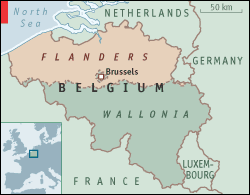 The Flemish love their cycling. So much so that tens of thousands of them will take to their bikes to cycle around (literally around) Brussels this Sunday, 3 September. The event, which is known as De Gordel (the belt), began in 1981 when 1.302 hardy souls cycled around the city and is now firmly established in the calendar with over 100.000 taking part in last years 25th anniversary edition.
The Flemish love their cycling. So much so that tens of thousands of them will take to their bikes to cycle around (literally around) Brussels this Sunday, 3 September. The event, which is known as De Gordel (the belt), began in 1981 when 1.302 hardy souls cycled around the city and is now firmly established in the calendar with over 100.000 taking part in last years 25th anniversary edition.De Gordel is, of course, highly political. Those who initiated the event in 1981 did so to demonstrate the Flemish character of the city's outer suburbs. If you look closely enough at the map of Belgium you will notice that Brussels is entirely surrounded by the Flemish province of Vlaams Brabant. The issue with this is that Brussels is about 80% French speaking as are many of those who live in the periphery (i.e. Vlaams Brabant). The problem for those in the periphery is that they are in Flanders and the people there speak Dutch.
As the Flemish have emerged from the cultural, economic and political shadow of their French speaking fellow Belgians, they have become increasingly assertive. In general they are withering in their criticism of the Francophones who simply can't or won't learn to speak Dutch. This issue is unsurprisingly particularly sensitive in the areas the French and Dutch speaking cohabit. Here the Flemish require all official business to be carried out in Dutch, much to the chagrin of the francophones, who are quite sure (and are generally right) that the officials behind the counter can speak French.
Fed up with increasingly restrictive rules on the (official) use of French in the periphery, a group of Francophones decided to petition the Council of Europe. The CoE produced a lengthy report criticising the situation in the Brussels periphery and detailing the situation of a number of different 'minorities' in Belgium.
One minority the report was silent on was the Dutch speakers in Brussels. The reason for the silence is that Brussels is officially a bi-lingual region and therefore the Dutch speakers can, in theory, carry out all of their official business in their own language. Except of course they can't. For the simple reason that so many people in the public sector positions cannot actually speak Dutch. This led to a Flemish petitioning of the Council of Europe for a resolution on language problems in access to public health care in the Brussels-Capital region in Belgium. This was duly provided and admits that the general level of bilingualism unfortunately remains rather low in the Brussels region.
So, 1:1 in the Council of Europe. The game is finely poised.
In the meantime, to cut a long and very sensitive story short, if you happen to be in Belgium this weekend and fancy going for a cycle....

3 comments:
now that is something really cool to know about! thaks for sharing the info
What about ze Germans?
I think that nowadays, the Francophones are jealous and resentful of the fact that the Flemish are in the majority in the country, and that flanders is significantly richer than Wallonia.
I wouldn't be suprised if Flanders sets of on its own in the not too distant future - but then what would happen to Brussels? A free city run by the EU?
brusselsliberal.blogspot.com
Post a Comment